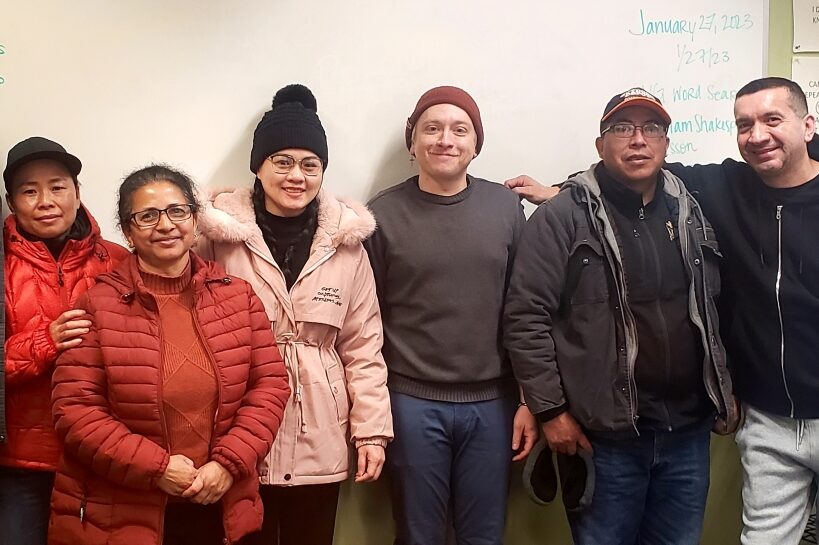Subbing at the AEC Takes a Local Bartender from On the Rocks to Life with a Twist
Mysterious Markings
The large sheet of paper is fine. Delicate. It is richly decorated. The students study it closely. They recognize numbers scattered about. Is there a pattern? Are they ascending or descending? Or, are they randomly scattered amidst a jumble of meaningless hieroglyphs?
No, these are not archeology students pouring over an ancient Egyptian papyrus. They are English-as-a-Second-Language (ESL) students learning to decipher the weekly deals grocery ad from the newspaper. However, when that weekly ad is written in a foreign language, the skills needed to decipher it are on a par with decoding papyri.

Remi Majeski boots up the projector during an ESL class.
“What are these units of measurement? Pounds…lbs. Ounces…oz. Doz for dozens. Ea for each,” explains Remi Majeski, ESL substitute teacher at the Durango Adult Education Center. He pauses the lesson to point out that many students may know the metric system, but not necessarily the Imperial system used in the U.S.
Remi has a keen eye for even more subtle forms of “language” embedded in the ads. A graduate from Fort Lewis College, he studied media and communication. He notes the ad’s colors, the foods and products, why they were chosen, how they are displayed—all these elements represent unspoken, subconscious messaging tied to American culture. Ads, like papyri, are complex layers of cultural sediment.
“Having knowledge of media, how it works, how to navigate it—that’s a huge aid to the students and how they live in the world,” Remi says.
Language Skills Are Life Skills
ESL students at the AEC arrive from diverse countries around the world. China, Ukraine, Columbia, Nepal. Sometimes, as many as twenty countries are represented in the Center’s Durango and Cortez classrooms over the academic year. Whether they know some English, or none; whether they have been in the U.S. for several years or just a few weeks, they learn the new language together.
“You have to be in the moment. On top of it,” Remi remarks on what it is like to manage an ESL classroom. “Figuring out how different your students are and all their levels. Trying to work around that and trying to include everybody. Sometimes there are some lessons that some students aren’t going to get it at all and other students it might be too easy for them. Trying to get everyone on the same page…that’s a challenge for sure!”
As the lesson continues, students examine the side notes, footnotes, and fine print. They notice how “free” is always in huge font, whereas conditions are small. FREE…when you buy two. Remi also covers how to navigate the shopping experience in the grocery store. How to use a coupon from the paper. How and why to scan those weird QR codes. He reviews the foods themselves. Many of the fruits or veggies may not be on shelves in students’ home country.
After class, Remi delves into the essential components of an ESL lesson. “It’s not just teaching them English,” he notes. “There are some who don’t even have formal schooling. Or they only completed a few grades. So they only learned so much. Maybe they don’t have basic math skills. Not only do I teach them English, but sometimes I have to teach them other basics, other life skills because they didn’t get that [earlier on].”
A Career on the Rocks

Remi ensures students have a clear understanding before moving on.
Remi is a born teacher. “Of all the things I wanted to do when I was kid, for some reason, specifically teaching ESL was top on my list. Which is a weird thing to want as a kid!” he says with a laugh. However, his immediate career path out of college did not lead him directly into teaching ESL. Instead, he wound up in the food service industry.
“I’ve been serving and bartending for over a decade,” he says. For a long time, he was a manager at the Glacier Club. He now manages full-time at 11th Street Station. “Managing restaurants and bars is not as glamorous as it seems. But I love food culture. I love bar culture. I enjoy serving people. I enjoy fine dining. It’s not something I went to school for; it’s just something I started doing to help get my foot in a door and start climbing up through the world. It’s what I have to do to survive.”
Survival took on a whole new meaning during the 2020 pandemic lockdowns. Remi, like all other food service professionals, was abruptly unemployed. Rather than fret, Remi seized the moment to live his lifelong dream. He invested all his free time and stimulus money into passing the Test of English as a Foreign Language (TOEFL) certification. Preparing for the test prepares an instructor to teach English grammar, reading, writing, and listening comprehension.
In a stroke of serendipity, he met Michelle Hall, the DAEC’s lead ESL teacher. They teamed up on studying and test preparation. By spring of 2021, Remi passed the exam. He began subbing at the Center by the fall.
“Remi is so professional,” says Michelle Hall. “He always makes himself available. He always ups his game to teach better and learn new skills.”
With a Twist, Please
More recently, something happened he did not anticipate.
He explains, “I initially wanted to do ESL because I wanted to go abroad and teach English. But once I started working more with the community here and working with people who really need the help more than people abroad that’s when I felt fine with sticking around here. I’d see more beneficial work to be done here than leaving the country and doing it somewhere else.”
His commitment to helping people locally solidified when a former student visited the Center with remarkable news. She had passed her U.S. citizenship test! She was overjoyed and so were all her teachers. And, like the weekly grocery ad, Remi detected in himself subtle layers of unspoken messages.
“Everything we that we did here for her—it helped her reach that huge goal. That huge, very hard to attain goal. Becoming an American citizen is not an easy feat by any means. I just felt like: Wow this is great! It’s not the only reason why I do this, but it is a HUGE reason. To help make their lives easier in this country.”
Now, Remi is hoping to “flip the switch” on his life. He would gladly trade the full-time food service career for a full-time ESL teaching career. He finds so much joy working with his students. They inspire him. “Just connecting with these students and how grateful they are and how often they show up,” he lists the aspects of teaching at the AEC that delight him.
“They’re adults. They honestly don’t have to take this on. This is all extra work for them on top of their jobs and raising families. But they’re just so grateful we’re here and I am grateful for the fact that they want to come. It’s really awesome.”
Throughout life’s twists—lime or lemon—teaching ESL at the DAEC helped Remi realize there’s no substitute for a life spent doing what you love.



